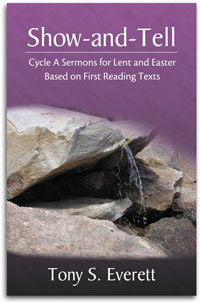SermonStudio
Is the Lord Among Us or Not?
Sermon
Show-and-Tell
First Lesson Cycle A Sermons for Lent and Easter
When most folks first come to seminary they enter with very high expectations of participating in a grand and glorious spiritual high. No doubts. No despair. Just higher and higher peaks of power and wonder. No valleys. No problems. Life together should be like belonging to a fabulous family filled with good feelings. No murmuring. No quarreling. Just happiness. Most students and their accompanying families have left behind real jobs that paid real money. They have left homes, friends, and relatives. They have left caring, supporting, compassionate congregations.


